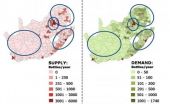(Press-News.org) MIAMI – (February 23, 2012) -- Sharks are among the most threatened of marine species worldwide due to unsustainable overfishing. Sharks are primarily killed for their fins alone, to fuel the growing demand for shark fin soup, which is an Asia delicacy. A new study by University of Miami (UM) scientists in the journal Marine Drugs has discovered high concentrations of BMAA in shark fins, a neurotoxin linked to neurodegenerative diseases in humans including Alzheimer's and Lou Gehrig Disease (ALS). The study suggests that consumption of shark fin soup and cartilage pills may pose a significant health risk for degenerative brain diseases.
"Shark fins are primarily derived through finning, a practice where by shark fins are removed at sea and the rest of the mutilated animal is thrown back in the water to die," said co-author Dr. Neil Hammerschlag, research assistant professor of Marine Affairs & Policy and director of the RJ Dunlap Marine Conservation Program (RJD) at UM. "Estimates suggest that fins from as many as 70 million sharks end up in soup. As a result, many shark species are on the road to extinction. Because sharks play important roles in maintaining balance in the oceans, not only is shark fin soup injurious to the marine environment, but our study suggests that it is likely harmful to the people who are consuming them."
Seven species of shark were tested for this study: blacknose, blacktip, bonnethead, bull, great hammerhead, lemon, and nurse sharks. Samples were collected from live animals in waters throughout South Florida.
"The concentrations of BMAA in the samples are a cause for concern, not only in shark fin soup, but also in dietary supplements and other forms ingested by humans, " says study co-author Prof. Deborah Mash, Director of the University of Miami Brain Endowment Bank. The Bank supports basic and clinical research and holds one of the world's largest collection of postmortem human brains encompassing a wide range of neurological disorders. In 2009, Prof. Mash and her co-authors published a study in the journal Acta Neurological Scandinavica, demonstrating that patients dying with diagnoses of Alzheimer's Disease and ALS had unusually high levels of BMAA in their brains up to 256 ng/mg, whereas normal healthy aged people had no BMAA, or only trace quantities of the toxin present. "BMAA was first linked to neurodegenerative diseases in Guam, which resulted in the progressive loss of structure and function of neurons."
The shark study found a similar range and even higher BMAA in the fins tested. The new study found levels of between 144 and 1836 ng/mg of BMAA, which overlapped the levels we measured in the brains of Alzheimer's and ALS victims. Surprisingly, this level fits with the BMAA levels in fruit bats examined by Paul Cox, animals which concentrate BMAA from their diet of cycad seeds. He linked ingestion of fruit bats to the severe ALS/Parkinsonism dementia that afflicted many people in Guam.
"Not only does this work provide important information on one probable route of human exposure to BMAA, it may lead to a lowering of the demand for shark fin soup and consumption of shark products, which will aid ocean conservation efforts," added Hammerschlag.
INFORMATION:
The project was funded through a generous donation from the Herbert W. Hoover Foundation. Established in 1990, the foundation takes a leadership role in supporting unique opportunities that provide solutions to issues related to the community, education, and the environment. Herbert W. Hoover was an early leader in the conservation movement, fighting to protect Biscayne Bay and leading the effort to create Biscayne National Park.
The University of Miami is the largest private research institution in the southeastern United States. The University's mission is to provide quality education, attract and retain outstanding students, support the faculty and their research, and build an endowment for University initiatives.
The Leonard Miller School of Medicine's Department of Neurology, through interdisciplinary collaborations with other medical specialists, and scientists in other disciplines, provides both compassionate quality care for complex neurological disorders and seeks better treatment and prevention mechanisms through cutting-edge research.
Founded in 2009, the R.J. Dunlap Marine Conservation Program is a joint program of the Rosenstiel School of Marine & Atmospheric Science and the Leonard and Jayne Abess Center for Ecosystem Science and Policy. The Rosenstiel School offers one of largest, most comprehensive marine and atmospheric programs in the nation. The Abess Center encourages innovative interdisciplinary initiatives that bridge the gap between hard science and environmental policy. You can support us by visiting ShopforSharks.com. For more information, please visit www.rjd.miami.edu
Neurotoxins in shark fins: A human health concern
University of Miami study shows alarming accumulation of BMAA neurotoxins in shark fins, which may pose a serious threat to shark fin consumers
2012-02-24
ELSE PRESS RELEASES FROM THIS DATE:
A Rhode Island Hospital physician's experience in front-line field hospital in Libya
2012-02-24
VIDEO:
Adam Levine, M.D., an emergency medicine physician with Rhode Island Hospital and a volunteer physician with International Medical Corps, was deployed to a field hospital near Misurata, Libya, during the...
Click here for more information.
PROVIDENCE, R.I. -- Adam Levine, M.D., an emergency medicine physician with Rhode Island Hospital and a volunteer physician with International Medical Corps, was deployed to a field hospital near Misurata, Libya, during the conflict ...
Vaccines for HIV: A new design strategy
2012-02-24
San Diego, Calif. – HIV has eluded vaccine-makers for thirty years, in part due to the virus' extreme ability to mutate. Physical scientists and clinical virologists from the Massachusetts Institute of Technology (MIT) and the Ragon Institute in Cambridge, Mass., have identified a promising strategy for vaccine design using a mathematical technique that has also been used in problems related to quantum physics, as well as in analyses of stock market price fluctuations and studies of enzyme sequences. The team, led by Arup Chakraborty of MIT and Bruce Walker of the Ragon ...
Girls' verbal skills make them better at arithmetic
2012-02-24
While boys generally do better than girls in science and math, some studies have found that girls do better in arithmetic. A new study published in Psychological Science, a journal of the Association for Psychological Science, finds that the advantage comes from girls' superior verbal skills.
"People have always thought that males' advantage is in math and spatial skills, and girls' advantage is in language," says Xinlin Zhou of Beijing Normal University, who cowrote the study with Wei Wei, Hao Lu, Hui Zhao, and Qi Dong of Beijing Normal University and Chuansheng Chen ...
Molding the business end of neurotoxins
2012-02-24
San Diego, Calif. – For snakes, spiders, and other venomous creatures, the "business end," or active part, of a toxin is the area on the surface of a protein that is most likely to undergo rapid evolution in response to environmental constraints, say researchers from Ben Gurion University in Israel. Understanding these evolutionary forces can help researchers predict which part of unstudied toxins will do damage, and may also aid in the design of novel synthetic proteins with tailored pharmaceutical properties. The team will present its results at the 56th Annual Meeting ...
For Latina moms, pediatrician's personality, empathy trump knowledge of Spanish, quick service
2012-02-24
A small study of Latina women with young children led by researchers at Johns Hopkins Children's Center shows moms value a pediatrician's empathy and warmth far more than their ability to speak Spanish or other conveniences.
A report on the findings is published online Feb. 15 in Maternal and Child Health Journal.
The lead investigator a pediatrics fellow at Johns Hopkins, conducted the research during post-residency training at the University of Michigan as a Robert Wood Johnson Foundation Clinical Scholar.
The study involved interviews with 38 Latina mothers with ...
Fast-food menu calorie counts legally compliant but not as helpful to consumers as they should be
2012-02-24
Calorie listings on fast-food chain restaurant menus might meet federal labeling requirements but don't do a good job of helping consumers trying to make healthy meal choices, a new Columbia University School of Nursing (CUSON) study reports.
The study, by Elizabeth Gross Cohn, RN, NP, DNSc, assistant professor of nursing at CUSON, and colleagues, was published online on February 16, 2012, in the Journal of Urban Health. The researchers studied the calorie counts for 200 food items on menu boards in fast-food chain restaurants in the New York inner-city neighborhood of ...
Protein assassin
2012-02-24
San Diego, Calif. – When bacteria wage a turf war, some of the combatants have an extra weapon. Certain strains of the bacteria E. coli produce proteins that kill competing E. coli and other like microbes, and researchers from Newcastle University in England have recently discovered something surprising about one of these lethal proteins: even after the toxic folded portion of the protein is removed, the unfolded end is still deadly. The finding may one day help scientists find new, more targeted ways to kill antibiotic-resistant microbes. The researchers will present their ...
Investigation links deaths to paint-stripping chemical
2012-02-24
EAST LANSING, Mich. — The deaths of at least 13 workers who were refinishing bathtubs have been linked to a chemical used in products to strip surfaces of paint and other finishes.
An investigation started by researchers at Michigan State University in 2011 has found that 13 deaths since 2000 – including three in Michigan – involved the use of paint-stripping products containing methylene chloride, a highly volatile, colorless and toxic chemical that is widely used as a degreaser and paint stripper. The chemical, in addition to being used in industrial settings, is available ...
Lloyds TSB Launches Junior Cash ISA at 3% and Calls on the Government to Open Up Accounts to All Parents
2012-02-24
Lloyds TSB today announces that it will offer a Junior Cash ISA, making it the first of the major high street banks to do so.
- Lloyds TSB is the first of the major high street banks to announce a Junior Cash ISA
- Account available from 13th February, meaning parents can take full advantage of the GBP3,600 annual Junior ISA allowance for 2011 / 2012
- New research indicates young adults increasingly reliant on financial support from their parents in their adult life
- Lloyds TSB urges the Government to allow parents to transfer Child Trust Fund accounts to Junior ...
Engineers improve allocation of limited health care resources in resource-poor nations
2012-02-24
In the developing world, allocating limited health care resources as effectively and equitably as possible is a top priority.
To address that need, systems engineers at the Georgia Institute of Technology are using computer models to help resource-poor nations improve supply chain decisions related to the distribution of breast milk and non-pharmaceutical interventions for malaria. They are also forecasting what health care services would be available in the event of natural disasters in Caribbean nations.
"We are using mathematical models implemented in user-friendly ...
LAST 30 PRESS RELEASES:
Start school later, sleep longer, learn better
Many nations underestimate greenhouse emissions from wastewater systems, but the lapse is fixable
The Lancet: New weight loss pill leads to greater blood sugar control and weight loss for people with diabetes than current oral GLP-1, phase 3 trial finds
Pediatric investigation study highlights two-way association between teen fitness and confidence
Researchers develop cognitive tool kit enabling early Alzheimer's detection in Mandarin Chinese
New book captures hidden toll of immigration enforcement on families
New record: Laser cuts bone deeper than before
Heart attack deaths rose between 2011 and 2022 among adults younger than age 55
Will melting glaciers slow climate change? A prevailing theory is on shaky ground
New treatment may dramatically improve survival for those with deadly brain cancer
Here we grow: chondrocytes’ behavior reveals novel targets for bone growth disorders
Leaping puddles create new rules for water physics
Scientists identify key protein that stops malaria parasite growth
Wildfire smoke linked to rise in violent assaults, new 11-year study finds
New technology could use sunlight to break down ‘forever chemicals’
Green hydrogen without forever chemicals and iridium
Billion-DKK grant for research in green transformation of the built environment
For solar power to truly provide affordable energy access, we need to deploy it better
Middle-aged men are most vulnerable to faster aging due to ‘forever chemicals’
Starving cancer: Nutrient deprivation effects on synovial sarcoma
Speaking from the heart: Study identifies key concerns of parenting with an early-onset cardiovascular condition
From the Late Bronze Age to today - Old Irish Goat carries 3,000 years of Irish history
Emerging class of antibiotics to tackle global tuberculosis crisis
Researchers create distortion-resistant energy materials to improve lithium-ion batteries
Scientists create the most detailed molecular map to date of the developing Down syndrome brain
Nutrient uptake gets to the root of roots
Aspirin not a quick fix for preventing bowel cancer
HPV vaccination provides “sustained protection” against cervical cancer
Many post-authorization studies fail to comply with public disclosure rules
GLP-1 drugs combined with healthy lifestyle habits linked with reduced cardiovascular risk among diabetes patients
[Press-News.org] Neurotoxins in shark fins: A human health concernUniversity of Miami study shows alarming accumulation of BMAA neurotoxins in shark fins, which may pose a serious threat to shark fin consumers


